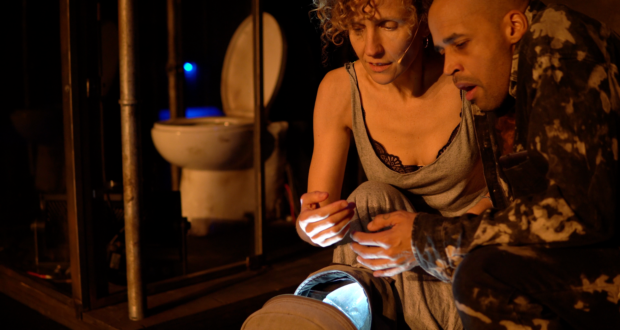A violent, savage, unsettling and emotional retelling of Oedipus, bringing Greek Tragedy to South London with bold theatre at its finest.Summary
Rating
Unmissable!
As I arrive at the fantastic Brixton House, a trigger warning is announced, which almost has me heading home. This isn’t the place to get into the debate around trigger warnings, but I would say I can’t imagine how you wouldn’t be affected in some way by this gut-wrenching, searingly intense play.
Oedipus Electronica is the story of Oedipus retold with pounding music and a contemporary female slant. You’d be foolish to head to a performance of a Greek myth and not expect a bit of violence, death, and incest. But wow! This show doesn’t hold back. There are emotional and deeply upsetting moments, but it’s the extreme violence paired with the increasingly frenetic electronica that prompts the deepest reaction.
Musicians Don Bird (drums) and Tom Penn (keyboards and double bass) are on stage the whole time, even becoming victims of Oedipus’s rage as the play climaxes. Their mix of electronics and increasingly ingenious double bass techniques are such an asset. It’s tempting to just watch them throughout. The music is gripping and all-encompassing, making my chest shake, but ingenious sound engineering from Daria Lipinska manages the levels beautifully, meaning it never tips over into ear-splitting volumes.
Brixton House’s theatre space is blessed with a very high ceiling, and theatre company Pecho Mama have made the most of this, with a stage built from industrial poles and a balcony level that they make incredible use of. As Oedipus’s rage reaches terrifying levels it appears as if the whole thing could fall apart. A double-sided mirror has the dramatic effect of a bomb going off, and the Perspex-screened toilet becomes the centre for events so violent you have to force yourself to keep looking. Lighting design also manages to be aggressive in this play, confronting the audience at moments when you want to hide.
The cast are phenomenal, boldly challenging the audience with screams of “is this entertainment for you?” as Mella Faye’s writing breaks the fourth wall. Ryan David Harston plays Oedipus: he’s strong and he makes Chris Evans’ movement direction look natural despite the incredible skill required to bring this to reality. He commands the stage with his anger and strength, yet his vulnerabilities are depicted with raw emotion as the truth of the situation starts to unravel. Faye as Jocasta is hard to watch at times. She’s a woman in desperation – it’s heart-breaking. Her final scenes with Oedipus are impossible to forget. And Kwame Bentil as Laius, although on stage for significantly less time, captures us with his love and desperation.
Faye’s writing is complex; it’s hard to work out what is just the writing of Jocasta, as she literally writes a script on stage, or what is the self-fulfilling prophecy of Oedipus – an unavoidable tragic conclusion. Placing Jocasta as the main character, trying desperately to keep hold of an ectopic pregnancy in modern day South London, as she writes her modern re-telling of Oedipus, is bold. It’s upsetting. The horror of struggling to conceive and accepting a non-viable pregnancy isn’t shied away from.
As the house lights went up, and the audience leapt to their feet, I overheard a man on my row say that it was the best thing he’d ever seen in Brixton. I’d argue it’s one of the best things I’ve seen in London. It’s scary, it’s raw, it’s deeply uncomfortable. I’ve never felt such fear while sitting safely in theatre seats before. The trigger warnings were right to be so thorough. Yet, had I left before it started, I would have missed out. This is theatre at its finest.
Written and directed by: Mella Faye
Music by: Pecho Mama (Alex Stanford, Don Bird and Mella Faye)
Lighting design by: Clare O’Donoghue and Tanya Stephenson
Lighting programming by: Samuel Bell
Produced by: Pecho Mama
Oedipus Electronica has now ended. You can find out more about Pecho Mama here.
 Everything Theatre Reviews, interviews and news for theatre lovers, London and beyond
Everything Theatre Reviews, interviews and news for theatre lovers, London and beyond



